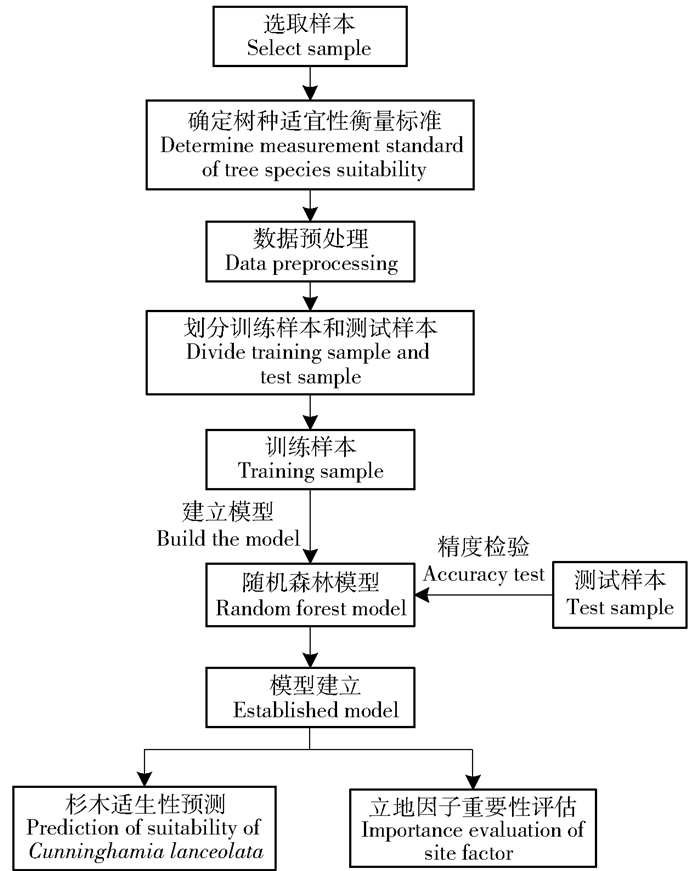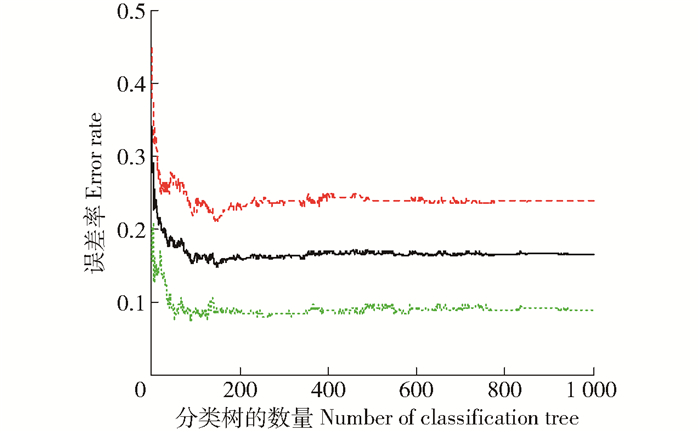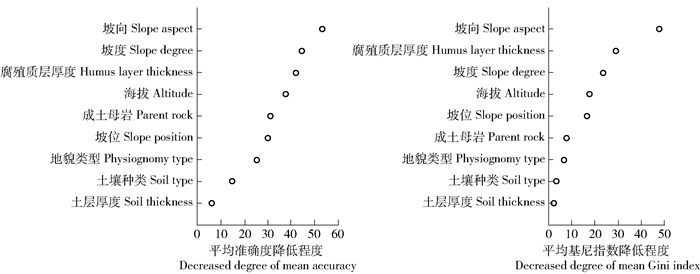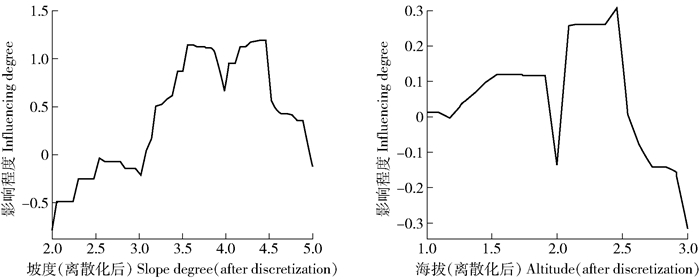Prediction of adaptability of Cunninghamia lanceolata based on random forest
-
摘要: 以中国林业科学研究院热带林业实验中心杉木树种为研究对象,从森林资源二类调查数据中提取优势树种为杉木的小班,将样本数据按7:3的比例分为训练样本和测试样本。以海拔、地貌类型、坡度、坡向、坡位、土壤种类、成土母岩、土壤厚度、腐殖质层厚度为输入变量,以杉木生长适宜性为输出变量,运用随机森林算法建立杉木适生性预测模型,对不同立地条件下的造林地进行杉木适生性预测。同时,利用随机森林模型的变量重要性评估功能,分析了各立地因子对杉木生长的影响权重。结果表明:基于随机森林的杉木适生性预测模型的训练精度为84.3%,泛化精度达到89.5%,具有较高的预测准确率;研究区域内对杉木生长影响较大的立地因子依次为坡度、坡向、腐殖质层厚、海拔,影响因素较小的是土壤种类、土层厚度;就单因素的影响而言,海拔≥350 m的低山和中山地区,坡度在25°~34°之间比较适宜杉木生长。基于随机森林的杉木适生性预测模型可处理复杂的非线性关系,可将模型应用到无林地的造林决策,实现有林地与无林地对杉木适生性判断的有机统一,也可推广到其他树种,为适地适树提供依据。Abstract: In this paper, Cunninghamia lanceolata was taken as research object in the Experimental Center of Tropical Forestry of Chinese Academy of Forestry, Pingxiang County of Guangxi Province of southern China, we selected the sub-compartments with dominant species of Cunninghamia lanceolata, divided the experimental data into training samples and test samples at 7:3 ratio and established a random forest model with altitude, physiognomy type, slope degree, slope aspect, slope position, soil type, parent rock, soil thickness, humus layer thickness as input variables and growth adaptability of Cunninghamia lanceolata as output variable to predict its adaptability for afforestation sites. At the same time, we analyzed the weight of main site factors on the growth of Cunninghamia lanceolata using the established model. This study showed that the training accuracy of adaptability of Cunninghamia lanceolata based on random forest model was 84.3% and the generalization accuracy reached 89.5%. Site factors greatly affecting the growth of Cunninghamia lanceolata were slope degree, slope aspect, the humus layer thickness and altitude, while soil type and soil thickness less affected the growth of Cunninghamia lanceolata. In terms of single site factor, the slopes ranged from 25° to 34° and the altitude greater than 350 m were more suitable for the growth of Cunninghamia lanceolata. The established model based on random forest could deal with complex nonlinear relations and could be applied to make afforestation decision to non-forest lands, then to realize the organic unification of the suitability judgment of Cunninghamia lanceolata with forest land and non-forest land, and the model can be extended to other tree species and provide theoretical support to the problem of matching species with site.
-
Keywords:
- matching species with site /
- random forest /
- Cunninghamia lanceolata /
- adaptability
-
-
表 1 杉木生长信息
Table 1 Growth information of Cunninghamia lanceolata
小班号
No. of
sub-compartment地貌类型
Physiognomy
type海拔
Altitude/
m坡向
Slope
aspect坡度
Slope degree/
(°)坡位
Slope
position土壤厚度
Soil thickness/
cm腐殖质层
厚度
Humus layer
thickness/
cm土壤种类
Soil type成土母岩
Parent rock平均
年龄/a
Mean
age/year优势木
平均高
Mean
height of
dominant
tree/m1 丘陵Hill 290 南South 20 脊Ridge 180 1 赤红壤
Latosolic
red soil砂岩Sandstone 25 17.5 2 丘陵Hill 370 西南
Southwest30 中坡Middle
slope100 1 赤红壤
Latosolic
red soil砂岩
Sandstone25 17.5 3 低山Lower
mountain350 东北
Northeast28 下坡
Downhill160 1 赤红壤
Latosolic
red soil砂岩
Sandstone19 17.5 4 丘陵Hill 200 西West 36 下坡
Downhill70 1 赤红壤
Latosolic
red soil砂岩
Sandstone19 17.7 5 低山Lower
mountain860 东East 30 上坡Uphill 70 1 赤红壤
Latosolic
red soil砂岩
Sandstone25 15.2 6 中山Middle
mountain660 南South 33 中坡Middle
slope70 2 赤红壤
Latosolic
red soil砂岩
Sandstone18 12.3 7 丘陵Hill 273 北North 21 下坡
Downhill80 2 紫色土
Purple soil砂岩
Sandstone19 11.8 8 丘陵Hill 415 无坡向No
slope aspect30 中坡Middle
slope130 10 赤红壤
Latosolic
red soil岩浆岩
Magmatic
rock17 16.5 9 低山Lower
mountain590 西北
Northwest15 谷地Valley 130 10 红壤
Red soil岩浆岩
Magmatic
rock21 19.6 10 低山Lower
mountain580 北North 30 下坡
Downhill130 5 黄红壤
Yellow-red
soil岩浆岩
Magmatic
rock23 17.8 11 低山Lower
mountain880 东南
Southeast37 中坡Middle
slope100 3 黄壤Yellow soil 岩浆岩
Magmatic
rock33 17.5 表 2 属性分级标准
Table 2 Attribute classification standard
立地因子Site factor 分级标准Classification standard 坡度
Slope degree平坡:<5°;缓坡:5°~14°;斜坡:15°~24°;陡坡:25°~34°;急坡:35°~44°;险坡:≥45°
Flat slope:<5°; Gentle slope: 5°-14°; Incline slope: 15°-24°; Steep slope: 25°-34°;
Sharp slope: 35°-44°; Dangerously steep slope: ≥45°土壤厚度
Soil thickness厚:≥80 cm;中:40~79 cm;薄:<40 cm
Thick: ≥80 cm; Medium: 40-79 cm; Thin:<40 cm腐殖质层厚度
Humus layer thickness厚:≥20 cm;中:10~19 cm;薄:<10 cm
Thick: ≥20 cm; Medium: 10-19 cm; Thin:<10 cm海拔
AltitudeⅠ级:<350 m;Ⅱ级:350~750 m;Ⅲ级:750~1 050 m;Ⅳ级:>1 050 m
Grade Ⅰ:<350 m; Grade Ⅱ: 350-750 m; Grade Ⅲ: 750-1 050 m; Grade Ⅳ:>1 050 m表 3 平衡前后各样本构成情况
Table 3 Composition of samples before and after balance
样本类别
Sample classification正样本
Positive
sample负样本
Negative
sample合计
Total原始样本Original sample 244 111 355 平衡后样本Sample after balance 333 333 666 表 4 不同的mtry取值对应误差的大小
Table 4 Errors corresponding to different mtry values
随机特征个数
Number of random feature(mtry)1 2 3 4 5 6 7 8 9 误差率Error rate 0.263 0.200 0.165 0.156 0.162 0.170 0.161 0.162 0.167 表 5 混淆矩阵
Table 5 Confused matrix of predictive results
实际类别
Actual type预测类别Predictive type 适宜Adaptability 不适宜Inadaptability 适宜Adaptability TP FN 不适宜Inadaptability FP TN 注:TP代表真正类,即模型预测结果为适宜生长,且实际情况也为适宜;FP代表假正类,即模型预测结果为适宜生长,但实际情况为不适宜;TN代表真负类,即模型预测结果为不适宜生长,且实际情况也为不适宜;FN代表假负类,即模型预测结果为不适宜生长,但实际情况为适宜。Notes:TP(true positive) implies that the predicted result and the reality are both the adaptability;FP(false positive) implies that the predicted result is the adaptability, but the reality is the opposite;TN(true negative) implies that the predicted result and the reality are both the inadaptability;FN(false negative) implies that the predicted result is the inadaptability, but the reality is the opposite. 表 6 随机森林模型混淆矩阵
Table 6 Confusion matrix of random forest model
实际类别
Actual type预测类别Predictive type 分类误差率
Classification
error rate/%适宜
Adaptability不适宜
Inadaptability适宜Adaptability 202 29 12.5 不适宜Inadaptability 44 191 18.7 表 7 测试数据预测结果
Table 7 Predicted results of test samples
实际类别
Actual type预测类别Predictive type 适宜Adaptability 不适宜Inadaptability 适宜Adaptability 95 16 不适宜Inadaptability 7 82 表 8 模型判断结果
Table 8 Predicted results of models
地类
Land
type地貌类型
Physiognomy
type海拔
Altitude/
m坡向
Slope
aspect坡度
Slope
degree/
(°)坡位
Slope
position土壤厚度
Soil
thickness/
cm腐殖质层
厚度Humus
layer
thickness/cm土壤种类
Soil type成土母岩
Parent
rock立地
指数
Site
index模型预测结果
Predicted results of model不适宜性概率
Probability of
inadaptability适宜性概率
Probability align="center" class="table_top_border2" of
adaptability结果
Result有林地
Forest land丘陵Hill 250 西北
Northwest26 中坡
Middle slope95 1 赤红壤Latosolic
red soil砂岩Sandstone 18 0.057 0.948 适宜
Adaptability低山Lower
mountain420 东北
Northeast20 下坡
Downhill90 1 赤红壤
Latosolic red soil岩浆岩
Magmatic rock22 0.008 0.992 适宜
Adaptability低山Lower
mountain290 西北
Northwest32 上坡Uphill 90 1 赤红壤
Latosolic red soil砂岩Sandstone 10 0.935 0.065 不适宜
Inadaptability无林地
Non-forest land低山Lower mountain 780 北North 17 上坡Uphill 70 1 赤红壤
Latosolic red soil砂岩Sandstone 无 0.843 0.157 不适宜
Inadaptability丘陵Hill 360 东北
Northeast22 中坡
Middle slope80 1 赤红壤
Latosolic red soil岩浆岩
Magmatic rock无 0.118 0.882 适宜
Adaptability低山Lower
mountain670 西
West15 中坡
Middle slope70 10 赤红壤
Latosolic red soil砂岩Sandstone 无 0.177 0.823 适宜
Adaptability -
[1] 黄云鹏.森林培育学[M].北京:高等教育出版社, 2002. HUANG Y P.Silviculture[M].Beijing:Higher Education Press, 2002.
[2] 郭艳荣, 刘洋, 吴保国.福建省宜林地立地质量的分级与数量化评价[J].东北林业大学学报, 2014, 42(10):54-59. doi: 10.3969/j.issn.1000-5382.2014.10.012 GUO Y R, LIU Y, WU B G.Evaluating dividing rank and quantification of site quality of suitable land for forest in Fujian Province, China[J].Journal of Northeast Forestry University, 2014, 42(10):54-59. doi: 10.3969/j.issn.1000-5382.2014.10.012
[3] CURT T, BOUCHAUD M, AGRECH G.Predicting site index of Douglasfir plantations from ecological variables in the Massif Central area of France[J].Forest Ecology and Management, 2001, 149(1):61-74. http://cn.bing.com/academic/profile?id=33a58ff18489b10367956465b4786ef8&encoded=0&v=paper_preview&mkt=zh-cn
[4] LOUWA J H, SCHOLES M.Forest site classification and evaluation:a South African perspective[J].Forest Ecology and Management, 2002, 171(1-2):153-168. doi: 10.1016/S0378-1127(02)00469-3
[5] 张伏全, 魏汗功, 陈远材.滇西南地区立地龙竹质量评价的研究[J].林业科学, 1994, 30(2):104-110. http://www.cnki.com.cn/Article/CJFDTotal-LYKE402.001.htm ZHANG F Q, WEI H G, CHEN Y C.Study on site quality evaluation of fragon bamboo in Southwest Yunnan[J].Scientia Silvae Sinicae, 1994, 30(2):104-110. http://www.cnki.com.cn/Article/CJFDTotal-LYKE402.001.htm
[6] 黄家荣, 马天晓, 王艳梅, 等.基于BP网络的无林地立地质量评价模型研究[J].山地农业生物学报, 2006, 25(6):479-483. doi: 10.3969/j.issn.1008-0457.2006.06.003 HUANG J R, MA T X, WANG Y M, et al.Forest site evaluation model studies on the basis of BP Neural Network[J].Journal of Mountain Agriculture and Biology, 2006, 25(6):479-483. doi: 10.3969/j.issn.1008-0457.2006.06.003
[7] IVERSON L R, PRASAD A M, MATTHEWS S N, et al.Estimating potential habitat for 134 eastern US tree species under six climate scenarios[J].Forest Ecology and Management, 2008, 254:390-406. doi: 10.1016/j.foreco.2007.07.023
[8] PRASAD A M, IVERSON L R, LIAW A.Newer classification and regression tree technique:bagging and random forests for ecological prediction[J].Ecosystems, 2006, 9(2):181-199. doi: 10.1007/s10021-005-0054-1
[9] DONG L J, LI X B.Prediction of rockburst classification using random forest[J].Transaction of Nonferrous Metals Society of China, 2013, 23(2):472-477. doi: 10.1016/S1003-6326(13)62487-5
[10] 余坤勇, 姚雄, 邱祁荣, 等.基于随机森林模型的山体滑坡空间预测研究[J].农业机械学报, 2016, 47(10):338-345. doi: 10.6041/j.issn.1000-1298.2016.10.043 YU K Y, YAO X, QIU Q R, et al.Landslide spatial prediction based on random forest model[J].Transactions of the Chinese Society for Agricultural Machinery, 2016, 47(10):338-345. doi: 10.6041/j.issn.1000-1298.2016.10.043
[11] 张雷, 王琳, 张旭东, 等.随机森林算法基本思想及其在生态学中的应用:以云南松分布模拟为例[J].生态学报, 2014, 34(3):650-659. http://d.old.wanfangdata.com.cn/Periodical/stxb201403015 ZHANG L, WANG L, ZHANG X D, et al. The basic principle of random forest and its application in ecology: a case study of Pinus yunnanensis[J].Acta Ecologica Sinica, 2014, 34(3):650-659. http://d.old.wanfangdata.com.cn/Periodical/stxb201403015
[12] 赖成光, 陈晓宏, 赵仕威, 等.基于随机森林的洪灾风险评价模型及其应用[J].水利学报, 2015, 46(1):59-65. http://d.old.wanfangdata.com.cn/Periodical/slxb201501008 LAI C G, CHEN X H, ZHAO S W, et al.Flood risk assessment model and its application based on random forest[J].Journal of Hydraulic Engineering, 2015, 46(1):59-65. http://d.old.wanfangdata.com.cn/Periodical/slxb201501008
[13] 邢海涛, 陆元昌, 刘宪钊, 等.基于近自然改造的马尾松林分竞争强度研究[J].北京林业大学学报, 2016, 38(9):42-53. doi: 10.13332/j.1000-1522.20160023 XING H T, LU Y C, LIU X Z, et al.Competiiton intensity of Pinus massoniana stand based on close-to-nature management[J].Journal of Beijing Forestry University, 2016, 38(9):42-53. doi: 10.13332/j.1000-1522.20160023
[14] BREIMAN L. Random forests[J].Machine Learning, 2001, 45(1):5-32. doi: 10.1023/A:1010933404324
[15] 张洪强, 刘光远, 赖祥伟.随机森林在肌电的重要特征选择中的应用[J].计算科学, 2013, 40(1):200-202. http://www.wanfangdata.com.cn/details/detail.do?_type=perio&id=jsjkx201301046 ZHANG H Q, LIU G Y, LAI X W. Application of random forest algorithm in important feature selection form EMG signal[J].Computer Science, 2013, 40(1):200-202. http://www.wanfangdata.com.cn/details/detail.do?_type=perio&id=jsjkx201301046
[16] 李新海.随机森林模型在分类与回归分析中的应用[J].应用昆虫学报, 2013, 50(4):1190-1197. http://d.old.wanfangdata.com.cn/Periodical/kczs201304041 LI X H.Using"random forest" for classification and regression[J].Chinese Journal of Applied Entomology, 2013, 50(4):1190-1197. http://d.old.wanfangdata.com.cn/Periodical/kczs201304041
[17] 齐颜君, 王丹, 孙喜林, 等.适地适树的意义与数量标准[J].现代农业科技, 2013(1):169. doi: 10.3969/j.issn.1007-5739.2013.01.104 QI Y J, WANG D, SUN X L, et al. The meaning and quantity standard of matching species with the site[J].Modern Agriculture Science and Technology, 2013(1):169. doi: 10.3969/j.issn.1007-5739.2013.01.104
[18] 孟宪宇.测树学[M].北京:中国林业出版社, 2006. MENG X Y. Forest measurement[M]. Beijing: China Forestry Publishing House, 2006.
[19] 姚山.基于数据挖掘技术的造林决策研究[D].北京: 北京林业大学, 2008. http://cdmd.cnki.com.cn/Article/CDMD-10022-2008085015.htm YAO S.Study on afforestation decision based on data mining[D]. Beijing: Beijing Forestry University, 2008. http://cdmd.cnki.com.cn/Article/CDMD-10022-2008085015.htm
[20] 曹正凤.随机森林算法优化研究[D].北京: 首都经济贸易大学, 2014. http://cdmd.cnki.com.cn/Article/CDMD-11912-1014220587.htm CAO Z F.Study on optimization of random forests algorithm[D]. Beijing: Capital University of Economics and Business, 2014. http://cdmd.cnki.com.cn/Article/CDMD-11912-1014220587.htm
[21] CHWLA N V, BOWYER K W, HALL L O, et al.SMOTE:synthetic minority over-sampling technique[J].Journal of Artificial Intelligence Research, 2011, 16(1):321-357. http://d.old.wanfangdata.com.cn/Periodical/dianzixb200911024
[22] 李婉华, 陈宏, 郭坤, 等.基于随机森林算法的用电负荷预测研究[J].计算机工程与应用, 2016, 52(23):236-243. doi: 10.3778/j.issn.1002-8331.1606-0203 LI W H, CHEN H, GUO K, et al.Research on electrical load prediction based on random forest algorithm[J].Computer Engineering and Applications, 2016, 52(23):236-243. doi: 10.3778/j.issn.1002-8331.1606-0203
[23] 郭颖婕, 刘晓燕, 郭茂祖, 等.植物抗性基因识别中的随机森林分类方法[J].计算科学与探索, 2012, 6(1):67-77. http://d.old.wanfangdata.com.cn/Periodical/jsjkxyts201201005 GUO Y J, LIU X Y, GUO M Z, et al.Identification of plant resistance gene with random forest[J].Journal of Frontiers of Computer Science and Technology, 2012, 6(1):67-77. http://d.old.wanfangdata.com.cn/Periodical/jsjkxyts201201005
-
期刊类型引用(4)
1. 张苗苗,罗于洋,王树森,张丽娜,马成功,于胜利,王景圆. 内蒙古旺业甸华北落叶松人工林空间结构分析及其优化. 西北林学院学报. 2024(01): 81-87+107 .  百度学术
百度学术
2. 荆媛,魏爽,史文辉,马梓贺,王德宇,戎可. 天然次生林中小斑啄木鸟的取食偏好. 野生动物学报. 2024(01): 84-94 .  百度学术
百度学术
3. 孙宇,刘盛,田佳歆,程福山,赵士博,王诗俊. 基于空间结构优化的长白落叶松人工林分间伐模型构建. 中南林业科技大学学报. 2023(01): 72-83 .  百度学术
百度学术
4. 刘鑫,黄浪,卿东升,李建军. 基于Voronoi空间单元的林分空间结构智能优化研究. 林业资源管理. 2023(04): 27-35 .  百度学术
百度学术
其他类型引用(2)




 下载:
下载:




